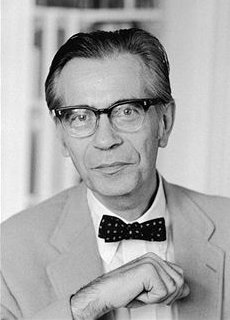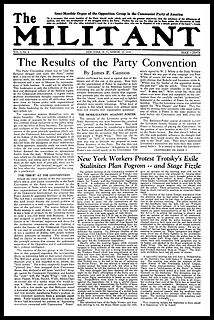Related Research Articles

The Democratic-Republican Party was an American political party founded by Thomas Jefferson and James Madison in the early 1790s that championed republicanism, political equality, and expansionism. The Democratic-Republicans became increasingly dominant after the 1800 elections as the opposing Federalist Party collapsed, and the party splintered during the 1824 presidential election. One faction of the Democratic-Republicans eventually coalesced into the modern Democratic Party, while the other faction ultimately formed the core of the Whig Party.

The Federalist Party, referred to as the Pro-Administration Party until the 3rd United States Congress as opposed to their opponents in the Anti-Administration Party, was the first American political party. It existed from the early 1790s to the 1820s, with their last presidential candidate being fielded in 1816. They appealed to businesses and to conservatives who favored banks, national over state government, manufacturing, and preferred Britain and opposed the French Revolution.

The Federalist Papers is a collection of 85 articles and essays written by Alexander Hamilton, James Madison, and John Jay under the pseudonym "Publius" to promote the ratification of the United States Constitution. The collection was commonly known as The Federalist until the name The Federalist Papers emerged in the 20th century.

Anti-Federalism was a late-18th century movement that opposed the creation of a stronger U.S. federal government and which later opposed the ratification of the 1787 Constitution. The previous constitution, called the Articles of Confederation and Perpetual Union, gave state governments more authority. Led by Patrick Henry of Virginia, Anti-Federalists worried, among other things, that the position of president, then a novelty, might evolve into a monarchy. Though the Constitution was ratified and supplanted the Articles of Confederation, Anti-Federalist influence helped lead to the passage of the United States Bill of Rights.
Bernard Bailyn is an American historian, author, and academic specializing in U.S. Colonial and Revolutionary-era History. He has been a professor at Harvard University since 1953. Bailyn has won the Pulitzer Prize for History twice. In 1998 the National Endowment for the Humanities selected him for the Jefferson Lecture. He was a recipient of the 2010 National Humanities Medal. He is married to MIT Professor of Management Lotte Bailyn and is the father of Yale astrophysicist Charles Bailyn and Stony Brook Linguist John Bailyn.

Richard Hofstadter was an American historian and public intellectual of the mid-20th century.

William Graham Sumner was a classical liberal American social scientist. He taught social sciences at Yale, where he held the nation's first professorship in sociology. He was one of the most influential teachers at Yale or any other major school. Sumner wrote widely within the social sciences, with numerous books and essays on American history, economic history, political theory, sociology, and anthropology. He supported laissez-faire economics, free markets, and the gold standard. He adopted the term "ethnocentrism" to identify the roots of imperialism, which he strongly opposed, and as a spokesman against it he was in favor of the "forgotten man" of the middle class, a term he coined. He had a long-term influence on conservatism in the United States.

Mike Wallace is an American historian. He specializes in the history of New York City, and in the history and practice of "public history". In 1998 he co-authored Gotham: A History of New York City to 1898, which in 1999 won the Pulitzer Prize in History. In 2017, he published a successor volume, Greater Gotham: A History of New York City from 1898 to 1919. Wallace is a Distinguished Professor of History at John Jay College of Criminal Justice, and at the Graduate Center, CUNY.

Vernon Louis Parrington was an American literary historian and scholar. His three-volume history of American letters, Main Currents in American Thought, won the Pulitzer Prize for History in 1928 and was one of the most influential books for American historians of its time.

Stanley Maurice Elkins was an American historian, best known for his unique and controversial comparison of slavery in the United States to Nazi concentration camps, and for his collaborations with Eric McKitrick regarding the early American Republic. They together wrote The Age of Federalism, on the history of the founding fathers of America. He obtained his BA from Harvard University using GI bill scholarship, Ph.D. in history from Columbia University and taught at the University of Chicago, spending most of his career as a professor of history at Smith College in Northampton, MA, where he raised his family and eventually retired.

The Yale Record is the campus humor magazine of Yale University. Founded in 1872, it became the oldest humor magazine in the world when Punch folded in 2002.

The First Party System is a model of American politics used in history and political science to periodize the political party system that existed in the United States between roughly 1792 and 1824. It featured two national parties competing for control of the presidency, Congress, and the states: the Federalist Party, created largely by Alexander Hamilton, and the rival Jeffersonian Democratic-Republican Party, formed by Thomas Jefferson and James Madison, usually called at the time the Republican Party. The Federalists were dominant until 1800, while the Republicans were dominant after 1800.
James Westfall Thompson (1869–1941) was an American historian specializing in the history of medieval and early modern Europe, particularly of the Holy Roman Empire and France. He also made noteworthy contributions to the history of literacy, libraries and the book trade in the Middle Ages.

The presidency of John Adams, began on March 4, 1797, when John Adams was inaugurated as the second President of the United States, and ended on March 4, 1801. Adams, who had served as vice president under George Washington, took office as president after winning the 1796 presidential election. The only member of the Federalist Party to ever serve as president, his presidency ended after a single term following his defeat in the 1800 presidential election. He was succeeded by Thomas Jefferson of the Democratic-Republican Party.
Robert Hugh Ferrell was an American historian and a prolific author or editor of more than 60 books on a wide range of topics, including the U.S. presidency, World War I, and U.S. foreign policy and diplomacy. One of the country's leading historians, Ferrell was widely considered the preeminent authority on the administration of Harry S. Truman, and also wrote books about half a dozen other 20th-century presidents. He was thought by many in the field to be the "dean of American diplomatic historians," a title he disavowed.
The Federalist Era in American history ran from 1788–1800, a time when the Federalist Party and its predecessors were dominant in American politics. During this period, Federalists generally controlled Congress and enjoyed the support of President George Washington and President John Adams. The era saw the creation of a new, stronger federal government under the United States Constitution, a deepening of support for nationalism, and diminished fears of tyranny by a central government. The era began with the ratification of the United States Constitution and ended with the Democratic-Republican Party's victory in the 1800 elections.
Eric Louis McKitrick was an American historian, best known for The Age of Federalism: The Early American Republic, 1788-1800 (1993) with Stanley Elkins, which won the Bancroft Prize in 1994.
Edward Webster Bemis was an American economist and a public utility expert. He was a proponent of municipal ownership.

The Communist League of America (Opposition) was founded by James P. Cannon, Max Shachtman and Martin Abern late in 1928 after their expulsion from the Communist Party USA for Trotskyism. The CLA(O) was the United States section of Leon Trotsky's International Left Opposition and initially positioned itself as not a rival party to the CPUSA but as a faction of it and the Comintern. The group was terminated in 1934 when it merged with the American Workers Party headed by A. J. Muste to establish the Workers Party of the United States.
Otis Livingston Graham Jr. (1935–2017) was an American historian, with a special interest in political history, immigration, and public history.
References
- ↑ "Banner, James M., Jr. 1935–". Contemporary Authors, New Revision Series.
- ↑ "James M. Banner, Jr". George Washington University. Retrieved 27 January 2020.
- ↑ Gordon S. Wood, The Idea of America: Reflections on the Birth of the United States (New York: Penguin Press, 2011), pp. 4, 339. New York Times Book Review, 17 May 1970, pp. 6-7.
- ↑ Diane Ravitch, statement on cover of The Elements of Teaching (2d ed.; New Haven: Yale University Press, 2017). Andrew Delbanco, ibid., p. vii.
- ↑ Orville Vernon Burton, Journal of American History, v. 101 (March 2015), pp. 1226-1227.